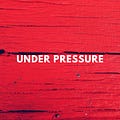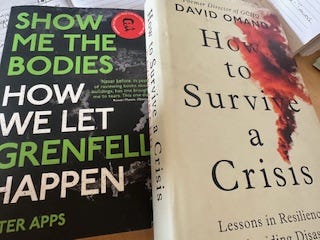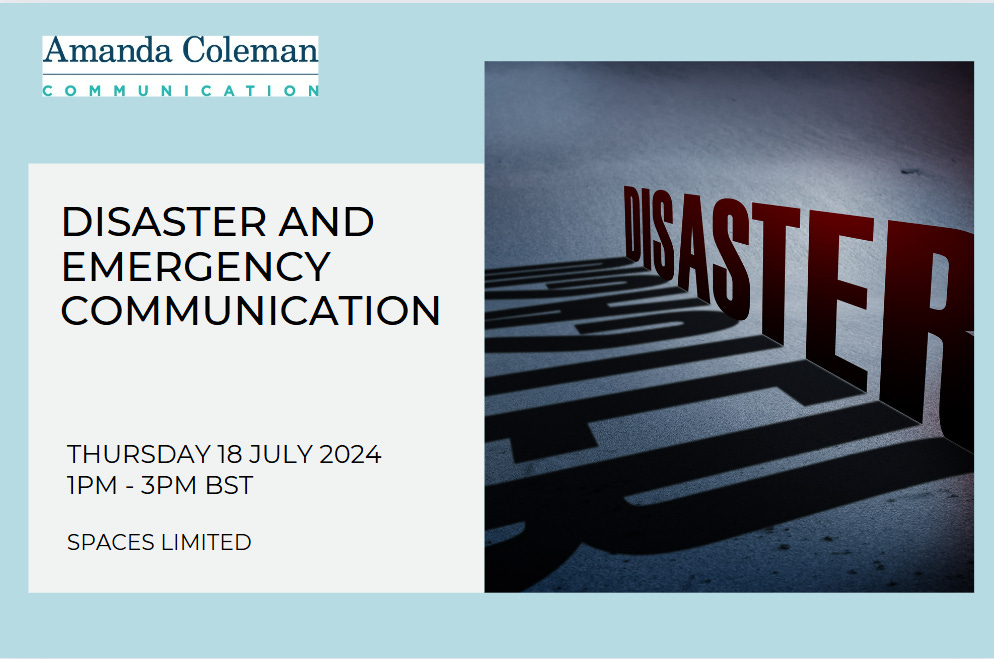When doing the right thing is hard
Communication doesn’t take place in a bubble. It is affected by what is going on in the world around us and this is also the case when dealing with a crisis or emergency situation. We have to recognise the state of the world around us and what that may mean for what we are doing.
It is with that in mind that I have been trying to raise awareness of the ethical decision making that communicators will be involved with during a crisis. PR and communication professionals can regularly have to deal with ethical dilemmas about what is said, when, and by who. Where are the facts and what is the truth? It may not appear as clear cut as we would like it to be.
Sometimes making the right decision and addressing problematic issues, behaviour or demands being placed on communication is tough. In the worst cases it can mean losing or leaving a job. We want to do the right thing but there are bills and costs we all have to face. Doing the right thing can be hard. So what can we do to help us when we are confronted by these situations?
Use the support networks that are around. The CIPR has an ethical hotline and decision making tree as well as other guidance that is available. But sometimes it is helpful to speak to someone who has had to face such difficult situations.
Try to influence the positive outcome from the situation. If you are uncomfortable with something you are being asked to do then try to raise how you feel with an explanation as to why. It is helpful to use facts from documents, research and case studies to support you with this.
Provide an external perspective on the situation that is causing the concern for you. It may help to see the bigger picture of the implications of taking different courses of action.
Ask enough questions to give you some clarity about the situation and your views about it. Investigate the situation to uncover the facts. Facts and truth are not necessarily the same thing. We can know the facts of a situation but not the truth about it. Seek clarity and be comfortable asking challenging questions.
Ultimately, remember that you can only do your best to try to address and challenge issues that make you uncomfortable. Sometimes this may mean making a stand even when you are out of the public spotlight.
PR and communication is going through a really turbulent time and is being scrutinised for how it behaves. From the Horizon IT public inquiry through to the responses provided when incidents have occurred. We have a chance to ensure we are a force for good if we challenge our approach.
What I have been reading
When I get the chance to read there are always new emergency, crisis and disaster books that are waiting for my attention. The latest two are worth sharing in case you are interested in them. Peter Apps’ book Show Me the Bodies is essential reading for anyone in a public service leadership role as well as communicators. Peter carefully and sensitively chronicles the Grenfell disaster in 2017. I recently finished David Omand’s book How to Survive a Crisis. A completely different book that looks at significant disasters over the years and what can be learnt from them. It explains some of the workings of the Cabinet Office Briefing Room and within Government. This is one for those in emergency planning and communication roles.
If you have any books to share let me know.
Trust and emergency communication
The trust deficit and issues affecting many organisations responding to emergencies was the focus of an article by Amanda in the recent edition of The Crisis Response Journal. (Find out more here.) If there is a lack of trust before a crisis occurs then can the response be effective. There are some points raised for all communicators and responders to consider.
Communicating after disasters
In the uncertain times that are being experienced, we can all potentially be faced with a disaster or emergency. But do our existing crisis communication plans have enough detail to be useful in these situations? Amanda is running a new session looking at disaster and emergency communication. It aims to help all communicators whether emergency responders or not with being ready for the worst cases. The two hour session will help you to feel more prepared for whatever may happen. To find out more about the session on 18 July email office@amandacolemancomms.co.uk
In Brief:
Congratulations to my good friend Bob Jensen who has been announced as the President of the newly established Emergency Management External Affairs Association (EMEAA). The association also has the experience of Ed Conley and Dan Stoneking as part of the senior team. To find out more check it out here.
An emergency contact number outage in Massachusetts led to an alert being issued in New York. The alert caused some confusion. Find out why here.
The Mayor of Calgary, in Canada made an apology for communication failures when there was a recent water failure that left people having to boil water. Find out more here.
For education establishments, the K12 Dive website has recently provided a list of the top school related crisis experienced in America. To find out more click here.
Emergency Planning Society members can hear Charlie Maclean-Bristol talk about cyber attacks and the importance of effective communication at a lunchtime session on 26 June. Check EPS emails for information.
The UK’s National Protective Security Authority recently published guidance about mitigating terrorist threats around the arrival and departure from venues and events. For more information find it here.
The July edition of the crisis communication case study Testing Times is due to be published next week. There is a tasty subject at the centre of the case study so email office@amandacolemancomms.co.uk if you would like to receive a copy.
Diary Dates:
On 12 July Amanda will be the guest chair for a SASIG session looking at security awareness programmes within businesses. Find out more about the session here.
On 18 July Amanda will be running her first training session looking at Disaster and Emergency Communication. The session is focused on the major incidents and the key aspects including mass casualties and fatalities. To find out more email office@amandacolemancomms.co.uk



